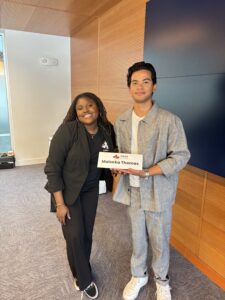The Canadian Alliance of Student Associations (CASA) recently travelled across the country having face-to-face conversations with Canadian students in its CASA on the Road initiative.
From September 2 to 18, CASA representatives heard about issues that matter from a range of communities, including here at Camosun College. On Tuesday, September 9, CASA member relations officer Maleeka Thomas met with students and the Camosun College Student Society (CCSS), which is a member of CASA.
Camosun students contribute 65 cents per month in fees for membership to CASA, a non-partisan, non-profit national student organization established in 1995 who advocate for students and work with their 27 member institutions across Canada. CASA has various committees that students sit on, including the College and Polytechnic Advisory Group, which Thomas says is particularly relevant to Camosun. (CCSS external executive Terence Baluyut currently sits on both the Member Relations Committee and the College and Polytechnic Advisory Group.)

“Camosun has been a member of CASA for a little bit of time now, and they have always been active within our committees and within our organization as a whole,” says Thomas. “[The College and Polytechnic Committee] is where their voices go directly to impacting CASA’s work on our college and polytechnic asks… They tend to be different from what undergraduate students at undergraduate universities are facing, and from those who are within the graduate programs at those universities as well. So that’s a pivotal committee that Camosun always is front of the line with, and brings voices directly to the federal government.”
Thomas says that some of the challenges that students have raised during the CASA tour include housing, food insecurity, financial aid, and accessing employment opportunities such as apprenticeships and work-integrated learning.
“Youth unemployment more specifically got to 14.2 percent in June alone of this year,” she says. “…We’ve not seen such a high number of unemployment amongst our youth in post-secondary since the 1980s, which is quite challenging for a lot of our students who are not able to get employment and are still expected to go to post-secondary.”
CASA lobbied for the elimination of interest on federal student loans, a change that directly affected all graduates when it happened in 2023.
“That directly impacts all students that we advocate for across the board,” she says. “Also, especially here at Camosun College, where you see [interest] on your student loans not being there, I think that’s a big step for all students, especially when you’re post-grad and you’re looking to start a life.”
CASA has also successfully campaigned for a $1.1 billion extension of elevated Canada Student Grants and Loans, $500 million invested in youth mental-health programs, and increases to the Canada Student Grant Program, which rose to $4,200 for 2024-2025 with a commitment to keep this as a permanent baseline. CASA also secured $242 million for Indigenous students across all institution types nationally through the Post-Secondary Student Support Program and advocated for a $925 million investment in Canadian research in 2018 and $825 million to increase graduate scholarships in 2024.
Beyond federal lobbying, CASA membership provides direct benefits to Camosun students. Member delegates attend conferences and meet with federal politicians. The organization also facilitates resource-sharing between institutions, allowing schools to adopt programs developed elsewhere, such as zero-textbook-cost initiatives.
But Thomas says that federal advocacy remains crucial because provincial funding for post-secondary education depends on federal transfers.
“Our job is to tell them to put more [money into education] so that you can pay less,” she says. “If we don’t advocate for more money to be pumped into the pool to come down to your provinces and to your institution, you’re ultimately going to be paying more in tuition fees.”
Thomas says that without student services and student advocacy, “student life is grim.”
“If you don’t have mental-health supports, if you don’t have anybody advocating for more of those [resources], then you’re ultimately going through university and colleges like, I don’t know, a robot.”
It’s important, says Thomas, for students to talk to their student society about their concerns, so the student society can then bring those concerns to CASA.
“I think it’s always important to speak with your student society representative and get to know who they are, because they’re the ones who are directly bringing what they’re hearing from students to us,” says Thomas. “And if you don’t bring anything to them, we won’t know.”

